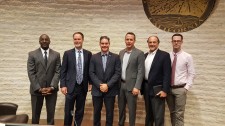
Business owners look to panelist for answers on joining the future of renewable energy
CHULA VISTA, CALIFORNIA, June 10, 2017 (Newswire.com) - Community members gathered to hear panelist discuss the future of technological advancements at South County Economic Development Council’s (SCEDC) Smart Cities Forum on Thursday, June 8.
Mayor Salas, who was in Paris during the negotiation phases of the climate agreement a few years ago, gave the opening remarks for the event. She commended Chula Vista for being a leader as a Smart City and spoke out against the decision to pull out of the Paris Agreement, noting that Chula Vista will continue to do their part to stop climate change, regardless of what is going on at the federal level.
"San Diego is one of the top five metropolitans for clean technology and the innovative work being done in Chula Vista and South County in general is a true testament to the regions dedication to staying ahead of the curve."
Cindy Gompper-Graves, President and CEO of SCEDC
“San Diego is one of the top five metropolitans for clean technology and the innovative work being done in Chula Vista and South County in general is a true testament to the regions dedication to staying ahead of the curve,” said Cindy Gompper-Graves, president and CEO of SCEDC.
Many panelists spoke about the future of the industry and the positive impact that it has. “Our region employs more people in the cleantech sector than the coal industry employs in the entire country,” said Jason Anderson, president and CEO of Cleantech San Diego. The industry has produced 38,087 jobs in San Diego County alone, and has a $6.8 billion economic impact on the region.
“Smart cities are cool,” said Cleve Adams, CEO of Site 1001 Inc. “We’re finding that young families are moving into the cities, which means more restaurants, more entertainment, more facilities and more business opportunities than we even thought of.”
Scott Cider, vice president of customer services at SDG&E, commented on the success of San Diego’s renewable energy consumption by noting that 43 percent of the energy in San Diego comes from renewable sources.
Another hot topic was the interconnectivity that needs to happen for smart cities to be successful. “Energy, water, mobility, buildings, efficiency, they all interconnect and if you are a company that can find those connections or provide a service that then provides additional data to connect up with that larger network then you’re fitting into that smart cities space,” said David Graham, deputy chief operating officer at City of San Diego. “What we’re finding is that big companies are relying on smaller vendors and subcontractors to do a lot of this. They’re relying on more agile companies. Working with the cities to be more green will give you a competitive advantage regardless of whether it’s actually spelled out, because those are the things that cities are caring about.”
Eamon Drumm, development executive at ENGIE, backed that up by discussing how economic impact, media and public relations, STEM education, community engagement, business improvement, sustainability and workforce development all play vital parts in creating a cohesive energy solution. The variety of components that go into building a successful solution means that job demands stretch across multiple industries of various skill levels.
As a leader in the Smart Cities initiative, Dennis Gakunga, chief sustainability officer of the City of Chula Vista, said, “if you want to attract local smart businesses, you grow local talent.” Noting that people don’t necessarily need to have a degree to be successful and that “it’s about looking to tap the workforce of tomorrow to make sure they’re comfortable with the technology and embracing the economies of tomorrow.”
The panel consisted of Dennis Gakunga, chief sustainability officer, City of Chula Vista; Jason Anderson, president and CEO, Cleantech San Diego; David Graham, deputy chief operating officer, City of San Diego; Cleve Adams, CEO, Site 1001 Inc.; and Eamon Drumm, development executive, ENGIE. Scott Cider, vice president of customer services at SDG&E, moderated the event.
To view presentations shown at the event, visit: http://www.southcountyedc.com/smart-cities-forum.
###
About Smart Cities
Smart Cities San Diego is a collaborative effort focusing on clean technologies, reducing greenhouse gas emissions and driving economic growth. The San Diego region is leading the nation in this effort.
About SCEDC
The South County Economic Development Council (South County EDC or SCEDC) is a non-profit organization formed in 1989 by a group of South San Diego County business and community leaders, to promote education and encourage economic development in the South San Diego County Region. Their member cities include Chula Vista, Coronado, Imperial Beach, National City, San Diego, San Diego County, and the Port of San Diego. They work with their partners in the northern portion of Baja California in the cities of Mexicali, Tijuana, Tecate, Rosarito and Ensenada.
Media Contact: Megan Maher // Phone: (619) 546-5390 // Email: megan@brownmarketingstrategies.com
Source: Brown Marketing Strategies on Behalf of South County EDC
Share:
